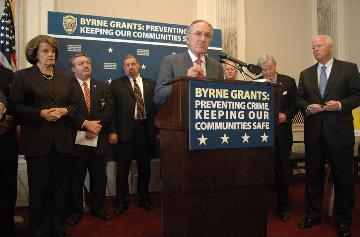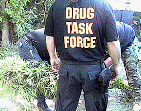Even as law enforcement and its allies in Congress move to restore funding for the embattled Byrne Justice Assistance Grant (JAG) program, which is best known for funding the legions of state- and local-level multi-jurisdictional drug task forces that now roam the land, the Bush administration has struck again, this time proposing folding it into a broader grants program and funding it at only $200 million. Now, law enforcement will have to fight a rear-guard action to get back last year's cuts while at the same time having to try to persuade Congress to undo the cuts proposed in this year's budget.

Funded at $520 million last year, the two-decade old JAG program that allows states to supplement their anti-drug spending with federal tax dollars was already down substantially from previous funding levels. For the past three years, as a cost-cutting move, the Bush administration has tried to zero it out completely, but that has proven extremely unpopular with Congress. This year, the House voted to fund the block grant portion of the program at $600 million and the Senate at $660 million, but in last-minute budget negotiations, the White House insisted the funding be cut to $170 million.
While federal funding for law enforcement drug task forces would appear to be a sacred cow in a law-and-order Republican administration, there are several reasons the JAG program is a tempting target for cost-cutters, said Eric Sterling, executive director of the Criminal Justice Policy Foundation and former counsel for the House Judiciary Committee.
"First, Bush is not running for reelection, so there is no political cost in that sense," Sterling said. "And if Congress does listen to the cops, Bush can blame Congress for exceeding his budget."

And the pressure of looming cuts feeds into the third reason JAG is now on the line: bureaucratic imperatives. "The budget deficit is a real headache for all agencies," Sterling said. "For a manager within the Department of Justice faced with cuts that would lay off FBI agents or US Marshals or faced with cutting a program that only gives money to someone else, the choice is easy. It's much easier for Justice to say 'let's cut this.'"
That sort of decision is made a little easier by a 2005 OMB report that undoubtedly is one of the underpinnings of the Bush administration's effort to cut the program. OMB described the program as "results not demonstrated," and found that it scored extremely poorly when assessed for planning and design, strategic management, and results and accountability. The same sort of assessments lay behind other drug war programs the administration has cut or attempted to cut, such as the drug czar's youth media program and the National Drug Intelligence Center, which is once again on the chopping block.
As the Chronicle noted in our recent report on the battle over JAG program funding, the drug task forces have been repeatedly criticized by drug reform, civil liberties, and civil rights organizations as out-of-control cowboys responsible for scandals like Tulia and Hearne, Texas. But such criticisms have played no noticeable role in the administration's assault on the program.
Nor have they resonated with a bipartisan group of senators who last week announced they would seek to reinstate 2008 fiscal year funding for the JAG program at a level of $660 million. Led by Sen. Tom Harkin (D-IA), the effort is also being backed by Sens. Kit Bond (R-MO), Joe Biden (D-DE), Saxby Chambliss (R-GA) and Dianne Feinstein (D-CA).
"Without financial support, Iowa communities are forced to combat crime and drugs with fewer and fewer resources. More than 10 Iowa counties have been forced to shut down their task forces because of funding cuts. This gutting of drug prevention programs cannot continue," Harkin said at a press conference announcing the move. "My aim is to restore Byrne Grants to a level that will give local law enforcement officials in Iowa and across the country ample funding for already successful anti-crime and anti-drug initiatives."
The senators' initiative is being supported and prodded by a powerful coalition of law enforcement groups, including the National Criminal Justice Association (NCJA), the National Narcotics Officers Associations Coalition, and the National Association of County Officials.
"Let there be no room for doubt, communities everywhere will see the effects of this bill and its cuts to criminal justice funding," said NCJA president David Steingraber. "A cut to the JAG program is a cut to local law enforcement and victims of crime everywhere. Congress has just made the job of every police officer in this country more difficult. Members of Congress have turned their backs on local law enforcement officers who are now forced to make due without significant federal assistance," Steingraber said. "It is our hope these drastic cuts are not a long-term solution to a federal fiscal problem. The safety of our nation is far too important and deserves adequate funding, with violent crime back on the rise".
But despite the formidable lobbying power of the police and their allies, the future of JAG funding remains in doubt. And drug reformers will unite with fiscal conservatives and the Bush administration in a strange alliance to try to keep the funding cuts intact.
"The reason the JAG funding was cut at the last minute last year was that it was obvious that Bush would veto it, and it remains clear that he pretty much wants to eliminate it," said Bill Piper, national affairs director for the Drug Policy Alliance. "This year's appropriations process is just starting, but what is interesting and hopeful is that because Bush wants to eliminate it completely, that is going to make it harder for the Democrats to restore last year's funding."
But not impossible. As law enforcement proponents of restoring the money told the Chronicle last week, they will try to get it back any way they can, including attaching it to either the economic stimulus package or the supplemental war funding appropriation. It's the latter that has Piper worried.
"The Iraq supplemental doesn't have to fit within the overall budget, and Bush would be reluctant to veto his war spending bill," he said. "I know law enforcement and some senators are already talking about this. Our challenge is to reach out to fiscal conservative organizations and craft a message that funding shouldn't be restored, but if it is, it should be earmarked for treatment. It can already be used for that, but most states don't."
The JAG grant program is but one line item in a record-breaking, deficit-building, $3 trillion dollar 2009 federal budget. But it is one line item that could stand to be completely eliminated. That probably won't happen this year, but it seems likely the drug task forces are going to have to limp along with reduced funding, persuade state and local governments to cough up more money, or go out of business once and for all.
This work by StoptheDrugWar.org is licensed under Creative Commons Attribution-ShareAlike 4.0 International
Comments
Rogue Cops
The vast majority of rogue cops are members of these so called task forces, the main task being to subvert justice. The sooner they're gone, the better for everyone! May they starve quickly.
Blogging your way
I did a post reacting to this story here:
http://gritsforbreakfast.blogspot.com/2008/02/texas-tulia-lesson-dems-should-join-gop.html
best,
Add new comment